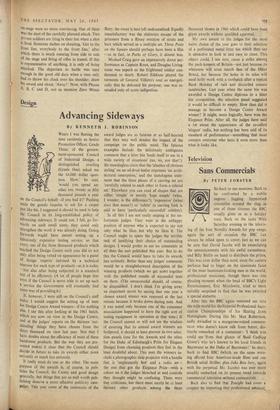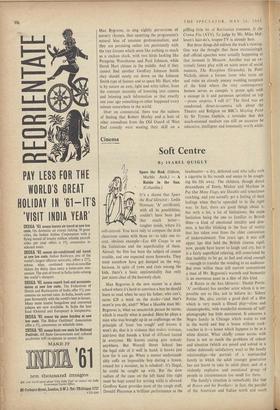Television
Sans Commercials
By l'ETER FORSTER
So back to our moutons. Back to be confronted by a nubile crocodiles around the ring in one of those circuses the BBC negress lugging hypnotised usually gives us as a holiday treat. Back on the same Whit Saturday evening to the televis- ing of the Ivor Novello Awards for pop songs, again the sort of occasion the BBC can always be relied upon to cover, just as we can be sure that David Jacobs will be enunciating the announcements with his awful earnestness, and Billy Butlin on hand to distribute the prizes. This was even duller than most, since the camera perforce had to linger on the inanimate faces of the most inanimate-looking men in the world, professional musicians, though there was one pleasing moment when the head of BBC's Light Entertainment, Eric Maschwitz, tried to seem suitably surprised to find that he was awarded a special statuette.
After this the BBC again ventured out into the wide world for the Imperial Professional Asso- ciation Championships of Ice Skating from Nottingham. During this Mr. Max Robertson, sadly dwindled to a margarine-voiced commen- tator who doesn't know talk from butter, dis- tinctly remarked of a contestant: 'I think you could see from that glance of Basil Cudlipp Green's why he's known to his local friends in Bayswater as the Duke of Bayswater!' In short, back to find BBC (which on the same even- ing offered four American-made films and one British serial thriller, plus Juke Box Jury, again with the perpetual Mr. Jacobs) was ever more steadily embarked on its present trend towards commercial television without commercials.
Back also to find that Tonight had come a cropper by importing that professional amateur, Max Bygraves, to sing nightly perversions of nursery rhymes, thus upsetting the programme's natural bias of amateur professionalism; and they are persisting rather too persistently with the tiny forums which seem like nothing so much as a cuckoo clock, with two birds looking like Peregrine Worsthorne and Paul Johnson, while Derek Hart chimes in the middle. And if they cannot find another Geoffrey Johnson Smith they should surely cut down on the Johnson Smith type of feature and so spare Mr. Hart, who is by nature an easy, light and witty talker, from the constant necessity of lowering into camera and intoning such information as that exactly one year ago something-or-other happened every minute somewhere in the world.
Over on commercial, there was the sadness of finding that Robert Morley and a host of other comedians from the Old Guard of West End comedy were wasting their skill on a piffling little bit of Ruritanian nonsense, If the Crown Fits (ATV). To judge by Mr. Miles Mal- leson's hair-do's, toupee-TV is already here.
But three things did enliven the week's viewing. One was the thought that those excruciatingly dull official speeches were actually happening at that moment in Moscow. Another .was an ex- tremely funny play with an acute sense of social nuances, The Reception (Granada), by Peter Nichols, about a former lover who turns up and ruins an already uneasy wedding reception of the kind where the very contemporary hostess serves as canapes 'a prune split with a sausage in it and parmesan sprinkled on top —prune surprise, I call it!' The third was an unadorned, direct-to-camera talk about the Theatre and Religion on BBC's Meeting Point by Sir Tyrone Guthrie, a reminder that this much-misused medium can still on occasion be educative, intelligent and immensely worth while.















































 Previous page
Previous page